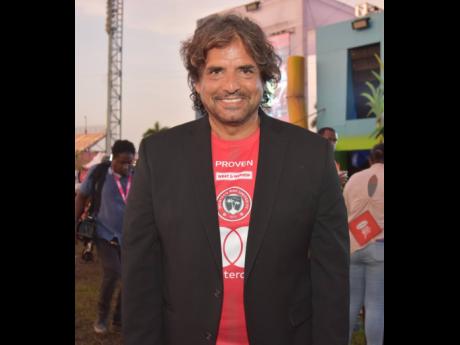Zapata believes in building homegrown core for Reggae Boyz
AFTER WITNESSING what he thought was a below-par display from the Reggae Boyz at the just-concluded Copa América in the United States,
Montego Bay United’s new Argentine coach, Rodolfo Zapata, believes Jamaica senior national football programme should place greater emphasis on developing a core of local players.
Zapata, who has a wealth of experience developing national youth teams in the United States and Canada, and has coached some of the biggest clubs across Africa, pointed out that international coaches do not have a lot of time with international club players and that it is prudent for Jamaica to have local talent working with the national team coach, who can then add the overseas-based players to create a balance squad.
“After seeing the Copa América, I believe the (Jamaica) team can do better. But at national team level, sometimes coaches don’t have time to work. So maybe in the future, they should pay attention to local talent as well,” said Zapata.
“Sometimes with the national team, the national coach don’t have time to work. But I say national coaches must have time to work. So if you have a base of local players, local talent, plus 10 overseas players, no more than 10, 12, it is better.
“Because 23 overseas players are a lot, and when you do not have time to work (with them), it’s better to work with local talent and then add the best overseas players,” he suggested.
Jamaica at the Copa America only had three local-based players.
South American giants Brazil, and Copa América champions, Argentina both received similar criticisms after the Copa América, with the latter having just one local-based Argentine on the squad. Brazil had three, compared to past squads that had close to 50 per cent local players in its make-up.
Although Zapata noted that it is hard to compare Jamaica with Brazil and Argentina, he believes Jamaica should have a local core that they are steadily developing and that these players should get the preference for less competitive regional matches and competitions.
“Some people say Argentina and Brazil have 25 players in Europe and they play good football. But it is difficult to compare Jamaica, or all the other Concacaf teams with other countries.
“But if you are going to play against Germany or Spain maybe I understand. But if you are going to play against Dominican Republic, Belize and Puerto Rico, there’s not a big difference.
“But if you are going to play against the big countries then maybe I agree that you will need those (overseas) players,” he reasoned.
He highlighted that Jamaica have a ‘unique’ opportunity to qualify for their second World Cup, but that the players must awaken their pride to represent the country and that all stakeholders must work hand-in-hand or it could be missed.
“In Argentina our national team is priority number one. All of them (players) are millionaires and the spirit to represent the country is so great because they go for no money when they play with national team.
“This maybe the difference between Argentina and other countries, because Maradona awoke the spirits that is proud to represent the national team, and I think Jamaica players need to be awoken and be proud to represent the national team,” he said.
He continued that. “The opportunity to qualify for 2026 World Cup is unique without Canada, Mexico and USA. It’s now or never. So all members, the federation, clubs, owners, players and media need to be together to get Jamaica to the World Cup. That (qualification) has to be mandatory. Without Canada, Mexico and USA, Jamaica and Costa Rica should be there. So it’s a must.”
However, he added that with the current opportunities for Jamaican players, there is no reason why they should not play abroad. But that having a local core in training will prove very beneficial.
“It is to carefully pick the proper players, and practise Monday to Thursday with local players and then on weekends they play the (Jamaica Premier) league but that is the problem of the (Jamaica) national team.”

